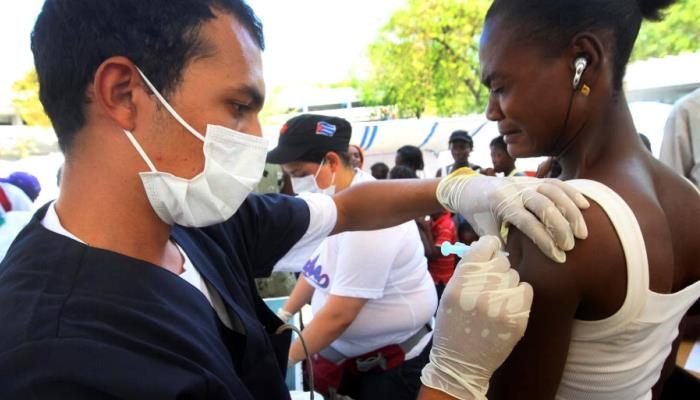
Exporting Revolution: Cuba’s Global Solidarity
By Margaret Randall
Durham: Duke University Press, 2017
Margaret Randall’s inimitable experience in Cuba is interesting, impressive, and important. Her time in Cuba in the 1970s took place during a fascinating period of Cuban development. Randall has a long track record of excellent publications that deal with Cuban poetry, art, and culture. In this book she attempts to combine personal stories and anecdotes involving Cuban artists and poets with musings about Cuba’s place in the international landscape. Her argument is that Cuba’s commitment to internationalism, through health, sport, and technical assistance throughout the Global South goes far beyond humanitarianism, solidarity, or soft power, and that Cuba actively tries to “export the revolution”. It is a bold claim that deviates significantly from much of what has been written in the literature about Cuban internationalism. Indeed, the nature of Cuban art is fascinating, and the place of Cuba in the international landscape is important. However, when attempting to explore Cuba’s internationalism through a discussion of personal anecdotes, and references to art and culture, Randall’s argument comes out hollow.
Cuban internationalism, its outward humanitarian work, and dedication to international solidarity efforts are profound. In fact, the focus on Cuban cooperation is a major corner stone of Cuban studies literature. Randall, in Chapter 13 writes: “a book could be written about the dozens of countries and millions of people who have benefited from Cuban medical aid over the past half century”. Fortunately, dozens have been written about this very topic (see Feinsilver, 1993; Kirk & Erisman, 2009; Brotherton, 2012 Huish, 2013). Randall’s bibliography only contains a few key sources, and looks over a large body of literature that discusses the origins, morality, purpose, and impacts of Cuban internationalism. She provides rather dated statistics on the impacts of the programs like Mision Milagro, a program to restore vision to the poor in Latin America and Africa, or the impacts of the Latin American School of Medicine, a medical school that provides free medical education to students from around the world. Randall highlights the key features of these programs, but not in a way that really backs up her argument that Cuba is exporting revolution.
The book meanders between personal anecdotes and political rallying cries against hegemonic globalization. Unfortunately the arguments are not always well articulated, and ham-fisted statements frequently appear throughout the book such as the following claim: “In the West Stalin is best known for the atrocities he committed against intellectuals and artists, as well as for the thousands who died of hunger during this command. For a more balanced view we should also remember that Stalin was Georgian – a hated minority – and inherited the world’s first socialist revolution at a time of almost insurmountable obstacles.” This claim is truly shocking, as there is no balanced view in nuancing massive human rights violations against the ethnicity of a tyrant. Including this claim in the opening of the book provides a loose and at times inaccurate account of socialism in the USSR, and has little relevance to Cuba. The discussion does little for building understanding of the Cuban experience.
Randall’s book can best be described as meandering. It is a collection of loose ideas strung together through a series of political claims, and personal stories. Randall’s own story of being an artist, mother, and revolutionary in Cuba from 1969 – 1980 is very much part of the book. Her story is fascinating and important, but it is confusing as to why it is the foundation for a book claiming to explain the ethos of Cuban internationalism.
The book could be an interesting autobiography, but it is a mélange of mixed ideas that require further clarification, and deeper research of the subjects. While it covers some important and fascinating issues, the final chapter titled “what did I learn” and the dismissiveness that more could be written about the subject really smacks in the face of scholars and students who have indeed written about these subjects in clear, well-crafted detail.
References
Brotherton, P. Sean (2012) Revolutionary Medicine: Health and the Body in Post-Soviet Cuba. Durham: Duke University Press
Huish, Robert (2013) Where no doctor has gone before: Cuba’s place in the global health landscape. Waterloo: Wilfrid Laurier University Press
Feinsilver, Julie M. (1993) Healing the Masses: Cuban Health Politics at Home and Abroad. Berkeley: University of California Press
Kirk, John M. and Michael H. Erisman (2009) Cuban Medical Internationalism: Origins, Evolution, and Goals. Basingstoke: Palgrave Macmillan